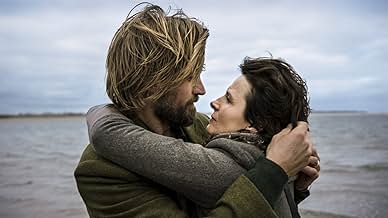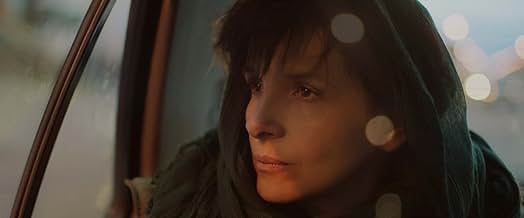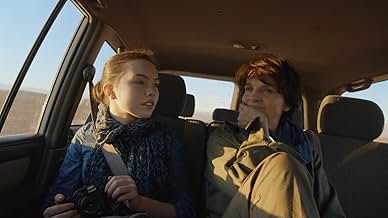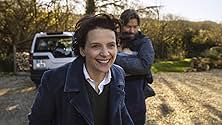IMDb RATING
7.0/10
8.4K
YOUR RATING
Rebecca is one of the world's top war photographers. She must weather a major emotional storm when her husband refuses to put up with her dangerous life any longer.Rebecca is one of the world's top war photographers. She must weather a major emotional storm when her husband refuses to put up with her dangerous life any longer.Rebecca is one of the world's top war photographers. She must weather a major emotional storm when her husband refuses to put up with her dangerous life any longer.
- Awards
- 6 wins & 14 nominations total
Chloë Victoria Annett
- Jessica
- (as Chloë Annett)
Zoubida Akif
- Ariana
- (as Zoubida Afik)
7.08.3K
1
2
3
4
5
6
7
8
9
10
Featured reviews
7OJT
Good, but slow drama about different needs
This is Norwegian director Erik Poppe's fourth feature film, and a film which many have had high expectations too. I must say this is a good film, but far from his best. I simply loved "Hawaii, Oslo" and "Troubled waters" which both was pretty much perfect film experiences. The debut film "Schpaa" was also very promising.
The script here is written by Norwegian author and screenwriter Harald Rosenløw Eeg, after a story by Erik Popp which is largely inspired by personal experiences as a war photographer.
We meet the great war photographer Rebecca (Juliette Binoche), living in Ireland, when she's home, that is. Because her relationship with her family is faltering due to her dangerous work, and many days away from home. She follows suicide bombers in Kabul, and rampage killers in Africa. Her husband is a marine biologist (Nicolai Coaster-Waldau), and he is very tired of her not being there, even when she's home. This is also affecting their two daughters.
Make no mistake. This is a good film, but I felt it lacked some tempo. The slow thinking pace may be correct to get the feeling, but the film loses momentum, and could easily be a disappointment for those expecting another Poppe masterpiece. Because this isn't. Well, it's an interesting theme, but what could have been a great drama is slipping away. It's not the actor's fault, because they are doing a great job.
The film is artistically beautiful, and the opening is really something which makes you speculate. I must admit I was a bit disappointed, since I reckon Poppe as the best Norwegian director ever. But this wasn't wholly fulfilling to me.
This won the Special Grand Prize of the jury at the 37th Montréal Film Festival 2013.
The script here is written by Norwegian author and screenwriter Harald Rosenløw Eeg, after a story by Erik Popp which is largely inspired by personal experiences as a war photographer.
We meet the great war photographer Rebecca (Juliette Binoche), living in Ireland, when she's home, that is. Because her relationship with her family is faltering due to her dangerous work, and many days away from home. She follows suicide bombers in Kabul, and rampage killers in Africa. Her husband is a marine biologist (Nicolai Coaster-Waldau), and he is very tired of her not being there, even when she's home. This is also affecting their two daughters.
Make no mistake. This is a good film, but I felt it lacked some tempo. The slow thinking pace may be correct to get the feeling, but the film loses momentum, and could easily be a disappointment for those expecting another Poppe masterpiece. Because this isn't. Well, it's an interesting theme, but what could have been a great drama is slipping away. It's not the actor's fault, because they are doing a great job.
The film is artistically beautiful, and the opening is really something which makes you speculate. I must admit I was a bit disappointed, since I reckon Poppe as the best Norwegian director ever. But this wasn't wholly fulfilling to me.
This won the Special Grand Prize of the jury at the 37th Montréal Film Festival 2013.
Disappointed
What I was hoping would be a thought-provoking trip into the psychology of the heart of bloody conflict instead becomes a pompous, boring, weighted thing of mediocrity. It's almost as if the director believes that the seriousness of the subject matter is enough to make the film compelling to audiences - which it isn't.
Unfortunately an important theme still requires pacing - which is not best accomplished by long silences and slow-mo ad-nauseum. The cardboard supporting cast display all the range of a TV commercial trying to inspire sympathy, and there's some atrocious child acting.
I know many people will feel compelled to like this because of the subject matter and the strong female lead, but beyond the façade of great cinematography and overly emotional music this is simply not well made.
Self-importance sinks this film.
Unfortunately an important theme still requires pacing - which is not best accomplished by long silences and slow-mo ad-nauseum. The cardboard supporting cast display all the range of a TV commercial trying to inspire sympathy, and there's some atrocious child acting.
I know many people will feel compelled to like this because of the subject matter and the strong female lead, but beyond the façade of great cinematography and overly emotional music this is simply not well made.
Self-importance sinks this film.
Loved it from start to end
I came into the movies with an open mind, without any knowledge of either the plot, setting or premise of the movie. The opening left me mesmerized, starting off with a silent photographer documenting a ceremonial initiation of a suicide bomber, to later become hurt in the subsequent IED attack. The following complications and insight to the photographer's life really builds up a powerful and emotional drama that mostly plays out within the borders of her own home.
From the reaction of her husband to their children's acceptance of their mother's dangerous occupation, every scene feels truly genuine. In addition to being a perfectly acted and directed movie, the cinematography is, to say the least, absolutely astonishing and beautiful. From start to end, the movie feels like a beautiful painting, with no expense spared on the details.
The most refreshing feature of this particular movie is the way the story is delivered, in a non-predictable fashion freed from the basic "Hollywood-recipe". To say the least, this is by far one of the best European movie released in years, and I am yet to see a movie this original, captivating, refreshing and complex from Hollywood. 10/10 stars, absolutely a must-see for all movie enthusiasts that appreciate something else than recycled, brain-dead black and white portraits of reality that Hollywood keeps producing.
From the reaction of her husband to their children's acceptance of their mother's dangerous occupation, every scene feels truly genuine. In addition to being a perfectly acted and directed movie, the cinematography is, to say the least, absolutely astonishing and beautiful. From start to end, the movie feels like a beautiful painting, with no expense spared on the details.
The most refreshing feature of this particular movie is the way the story is delivered, in a non-predictable fashion freed from the basic "Hollywood-recipe". To say the least, this is by far one of the best European movie released in years, and I am yet to see a movie this original, captivating, refreshing and complex from Hollywood. 10/10 stars, absolutely a must-see for all movie enthusiasts that appreciate something else than recycled, brain-dead black and white portraits of reality that Hollywood keeps producing.
'Someone must make the world see....'
A film about a female investigative journalist is bound to raise a reaction among viewers, especially when the atrocities filmed are so brutal. But that is the point being made by writer/director Erik Poppe (with added written material by Harald Rosenløw-Eeg and Kirsten Sheridan). The main character in this story is Rebecca (a radiant and brilliant Juliette Binoche), one of the world's top war photographers. She must weather a major emotional storm when her husband Marcus (Nikolaj Coaster-Waldau) refuses to put up with her dangerous life any longer. He and their young daughters – especially Steph (Lauryn Canny) but also the much younger Lisa (Adrianna Cramer Curtis) - need Rebecca, who, however, loves both her family and her work. Rebecca has been angry, since a child, over the way people around the globe focus on the detritus of local news and pay little attention to the horrors that occur daily in the countries besieged by terror. Rebecca resolves to take Steph (at Steph's request) to Kenya where inadvertently they witness terrorist acts even though Rebecca had been promised the area was safe. The result of Rebecca's endangering her daughter results in her marriage dissolving, but other changes in Rebecca's smoldering anger and angst result also.
The film is very well photographed and both Binoche and Coaster-Waldau are excellent. The supporting cast is strong (especially a very small bit part for Maria Doyle Kennedy) and the musical score by Armand Amar is deeply moving. The film places before us the incalculable struggles war correspondents face but at the same time it brings to out attention just how impossibly difficult life in troubled countries can be. Grady Harp December 14
The film is very well photographed and both Binoche and Coaster-Waldau are excellent. The supporting cast is strong (especially a very small bit part for Maria Doyle Kennedy) and the musical score by Armand Amar is deeply moving. The film places before us the incalculable struggles war correspondents face but at the same time it brings to out attention just how impossibly difficult life in troubled countries can be. Grady Harp December 14
Caught between passion and family.
Frankly, I never knew what the movie is about. What I expected was a beautiful romantic drama and I got a movie that defined someone's struggle over her passion and its reality. After seeing opening scene I thought it would be another movie about war similar to the '5 Days of War'. I am glad it was so distinct which was partially based on the director own experiential story when he served as a photojournalist in the '80s. It is a jointly produced movie by Ireland and Norway in English language.
Rebecca is a passionate war zone photojournalist and her daring attitude make her one of the finest on the field. Like always her latest journey takes place in the war torn city of Kabul, Afghanistan. She follows a suicide bomber to cover up the story where she gets injured. After the accident the whole story flips back to her home in Ireland where it chronicles the worried husband and the two children who are very affectionate of her. This is the time where she has to choose the side, the professional? Or the family? The stay at home during recovery makes her realize the worth of her life. So the movie's end strikes with the path she opts to travel forth.
''Sometimes it's hard to stay at home. I mean, the one who stays at home has the hardest job.''
Well, it served a message with the touch of melodrama. The story demonstrated family value on the right amount of each others love and care. The opening and the end scenes that take place in Afghanistan was so brutal and there's another one that takes place in Kenya. But bringing the reality on the screen as it happening some places of the world must be appreciated. It kind of makes you realize that someone is sacrificing their life to bring light on what's happening in the war zones. Like always, Juliette Binoche was good. It was her movie, her side of the story told when she was caught between the family who loves and the war that calls her.
One of the fascinating thematic movie. Regarding the main role, you may think why she's not stopping the tragedy from happening. That's the journalism, when you have no power to act, just expose to the rest of the world. The combination of family drama and the conflict zone are like two different genres that brought together awesomely. The director's own experience helped to shape the movie well. Almost all the combat related scenes were so realistic as what he had seen is now letting us know through this film. I think this movie is a must see. The end scene makes us go speechless, woefully.
Rebecca is a passionate war zone photojournalist and her daring attitude make her one of the finest on the field. Like always her latest journey takes place in the war torn city of Kabul, Afghanistan. She follows a suicide bomber to cover up the story where she gets injured. After the accident the whole story flips back to her home in Ireland where it chronicles the worried husband and the two children who are very affectionate of her. This is the time where she has to choose the side, the professional? Or the family? The stay at home during recovery makes her realize the worth of her life. So the movie's end strikes with the path she opts to travel forth.
''Sometimes it's hard to stay at home. I mean, the one who stays at home has the hardest job.''
Well, it served a message with the touch of melodrama. The story demonstrated family value on the right amount of each others love and care. The opening and the end scenes that take place in Afghanistan was so brutal and there's another one that takes place in Kenya. But bringing the reality on the screen as it happening some places of the world must be appreciated. It kind of makes you realize that someone is sacrificing their life to bring light on what's happening in the war zones. Like always, Juliette Binoche was good. It was her movie, her side of the story told when she was caught between the family who loves and the war that calls her.
One of the fascinating thematic movie. Regarding the main role, you may think why she's not stopping the tragedy from happening. That's the journalism, when you have no power to act, just expose to the rest of the world. The combination of family drama and the conflict zone are like two different genres that brought together awesomely. The director's own experience helped to shape the movie well. Almost all the combat related scenes were so realistic as what he had seen is now letting us know through this film. I think this movie is a must see. The end scene makes us go speechless, woefully.
Did you know
- Trivia"A thousand time goodnight" is a line from William Shakespeare's Romeo and Juliet.
- GoofsWhen Rebecca and Marcus are walking hand in hand on the beach after drinking wine with his colleagues, the second shot is a frontal medium shot. In the upper left part of the shot, the sound operator's boom microphone is briefly, but clearly visible.
- How long is 1,000 Times Good Night?Powered by Alexa
Details
- Release date
- Countries of origin
- Official sites
- Language
- Also known as
- A Thousand Times Good Night
- Filming locations
- Production companies
- See more company credits at IMDbPro
Box office
- Budget
- €5,284,200 (estimated)
- Gross US & Canada
- $53,895
- Opening weekend US & Canada
- $24,120
- Oct 26, 2014
- Gross worldwide
- $2,549,568
- Runtime
- 1h 57m(117 min)
- Color
- Sound mix
- Aspect ratio
- 2.35 : 1
Contribute to this page
Suggest an edit or add missing content































